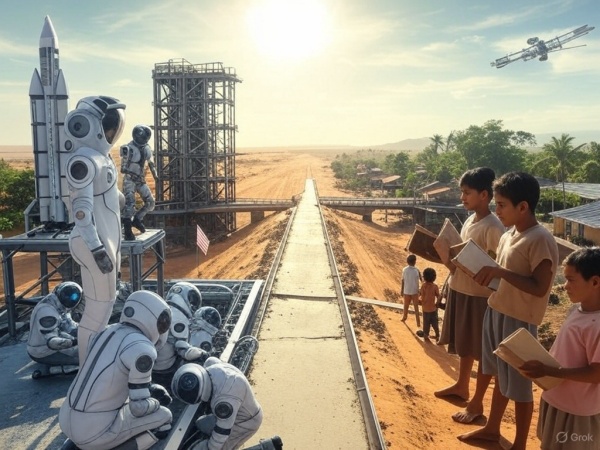Read, Comment and Share –
Aboard the Dragon capsule, developed by SpaceX, four astronauts from different nationalities arrived at the International Space Station (ISS) in yet another crew rotation mission. Meanwhile, two Americans anxiously awaited their return to Earth after spending nine months in space due to a technical failure in Boeing’s Starliner capsule. What could have been a space drama became yet another chapter in the triumph of American private technology. And once again, Elon Musk’s name stands at the forefront of this story.
While the United States is moving toward an era of space exploration driven by private companies, Brazil, trapped in ideological disputes and an outdated educational system that barely prepares professionals for the 21st century, watches from the sidelines—incapable of even dreaming of playing a relevant role in the innovation game.
Elon Musk and the New Space Era
When NASA launched the Commercial Crew program, it paved the way for a revolution. Instead of developing its own spacecraft, it began contracting private companies to handle the task. In 2020, SpaceX became the first private company to send humans into space, a feat previously restricted to powerful nations.
In 2020, SpaceX became the first private company to send humans into space—a feat previously reserved for powerful nations.
Now, SpaceX not only launches astronauts but also rescues them with technology that impresses with its efficiency. The reusable Dragon capsule, operated almost entirely by artificial intelligence, docks with the ISS with surgical precision, requiring no manual intervention. While Boeing struggles to get Starliner fully operational, SpaceX is already setting its sights on Mars.
Elon Musk, with his “failure is a step toward success” mindset, has revolutionized not just the space race but the very way the U.S. approaches technology. His philosophy of accelerated innovation has positioned SpaceX at the forefront of commercial space exploration, surpassing aerospace giant Boeing and even NASA in some areas.
Brazil: A Nation Stuck in the Past
Meanwhile, Brazil—once a country with a promising space program—is now mired in ideological debates that paralyze any attempt at technological progress. Investment in science is negligible, and education is increasingly disconnected from the real-world demands of the modern workforce.
In the United States, artificial intelligence and automation are driving new industries and shaping the jobs of the future. In Brazil, public schools are still debating whether math and Portuguese should take a backseat to ideological agendas that have little to do with the job market.
The government, held hostage by outdated dogmas, ignores the fact that science and technology are the true engines of progress. Instead of fostering innovative startups, the country suffocates entrepreneurs with bureaucracy, exorbitant taxes, and absurd regulations.
While Musk invests billions to make humanity interplanetary, Brazil can’t even ensure quality internet access in all schools. While SpaceX sends astronauts into space and brings them back with surgical precision, Brazilian scientists face budget cuts and a lack of basic equipment.
The World Runs. Brazil Walks.
History teaches us that countries that invest in technology and education dominate the future. The United States, China, India, and even small European nations are rapidly advancing in the race for innovation. Brazil, on the other hand, remains bogged down in empty debates and regressive policies.
The ISS astronaut rescue mission is not just a technological achievement—it is a brutal reminder of how the U.S. continues to innovate while countries like Brazil fall further behind the front lines of progress. And if nothing changes, the future will keep arriving… for everyone else.


